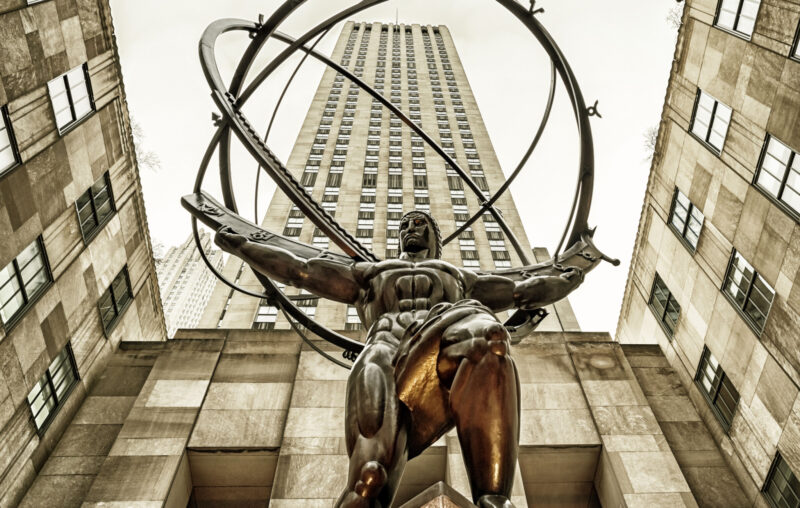


Michael Munger recently raised an issue of the utmost importance: proponents of classical liberalism have forsaken the task of making the moral case for capitalism. Thinking that drawing everyone’s attention to capitalism-induced prosperity is enough to capture minds and hearts, as Iain Murray elaborated, all we did was throw economic logic at people, “hoping it will stick.” But with that we left a moral vacuum which progressives and collectivists were eager to fill with their vision of a good society. We need, as George Leef summarized, “teachers and professors who will make the moral case for liberty.”
If only there were a radical proponent of individual rights who could help accomplish the task. Someone who would spend her life advocating capitalism as the only moral system, who would call capitalism the “Unknown Ideal,” sell millions of books dramatizing and explaining the virtues of individualism and capitalism, and inspire thousands of minds. If only there were someone who could have warned the new intellectuals that they “must fight for capitalism, not as a ‘practical’ issue, not as an economic issue, but, with the most righteous pride, as a moral issue. That is what capitalism deserves, and nothing less will save it.”
Maybe such a thinker could explain the “moral meaning of the law of supply and demand,” which is that in a free market the economic value of man’s work is determined by one principle: “the voluntary consent of those who are willing to trade him their work or products in return.” Or maybe, she could demonstrate that money, “those pieces of paper, which should have been gold,” are not just a medium of exchange or store of value, but “a token of honor – your claim upon the energy of the men who produce,” and that your wallet is a “statement of hope that somewhere in the world around you there are men who will not default on that moral principle which is the root of money.” Maybe, just maybe, such a thinker could help the advocates of classical liberalism and free markets rethink and put their positions in moral terms.
“Near total lack of empirical lived experience with socialism’s manifest defects,” Munger points out, contributes to the rising interest in socialism. Imagine if that same thinker, having suffered socialism herself, could convey the horrific experience of living (or more precisely, slowly dying) under socialism to those who, hopefully, would never have to? She could, say, write a novel, a tool humanity invented to immortalize stories and experiences. A catchy title like We the Living could seize the attention of millions of readers, while educators today would only need to order some copies to their classrooms for free and hand them out to students. That would be something.
Sure, this thinker could still do more. As Iain Murray said, if we were to make a moral case for capitalism, we might need “to look at the foundations of moral thinking” itself. Maybe she would even need to be so extreme as to call for “nothing less than a moral revolution,” pointing out that, on the basis of altruistic morality, “capitalism had to be–and was–damned from the start”? This radical new view, of course, would put her at odds with, and lead her to be ignored by those unwilling to challenge conventional morality, which ascribes moral importance only to pain, need, suffering, self-abnegation, and sacrifice. Imagine, however, if she did not waver, and proceeded to lay the foundations of a new morality that designates the pursuit of one’s own happiness, ambition, success, and achievement — everything capitalism allows and celebrates — not as morally irrelevant (at best), but as supreme values.
We lack “a liberal Utopia…a truly liberal radicalism,” Munger quotes F.A. Hayek saying. Hear, hear. If only we had a thinker who could portray (again, in a best-selling book, later made available for free) what benevolence, respect, and happiness could be achieved when people come to live as free, moral equals, swearing by their life and love of it to “never live for the sake of another man, nor ask another man to live for mine.”
If only there were Ayn Rand…
TELL YOUR FRIENDS ABOUT CITIZENS JOURNAL Please keep us publishing – DONATE





That train has left the station. In 1933 HG Wells wrote a futuristic novel “The Shape of Things to Come”. He was so eerily prescient about the future. Read his Chapter Europe 1960 and remember this was written in 1933…. https://www.telelib.com/authors/W/WellsHerbertGeorge/prose/thingstocome/thingstocome24.html